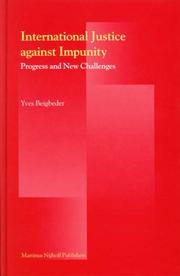| Listing 1 - 4 of 4 |
Sort by
|

ISBN: 900414451X 9789004144514 9789047407799 9047407792 1280868783 9786610868780 9781280868788 6610868786 Year: 2005 Publisher: Boston Martinus Nijhoff Publishers
Abstract | Keywords | Export | Availability | Bookmark
 Loading...
Loading...Choose an application
- Reference Manager
- EndNote
- RefWorks (Direct export to RefWorks)
This volume reviews the achievements and limitations of the International Criminal Tribunals for the former Yugoslavia and Rwanda, and the creation of mixed national/international courts: the Special Court for Sierra Leone and the Cambodia Tribunal. The major, unexpected and promising judiciary innovation is however the creation of the International Criminal Court in 1998, supported by the UN, European Union members and other countries, effectively promoted by NGOs, but strongly opposed by the USA. The Court will have to show that it is a fair and valuable instrument in fighting impunity at the international level.
International crimes --- International criminal courts --- War crimes --- Crime --- Criminal courts --- International courts --- Complementarity (International law) --- Crimes, International --- International crime --- International offenses --- International criminal courts. --- War crimes. --- International crimes.

ISBN: 1281400009 9786611400002 904741070X 9789047410706 9004153292 9789004153295 Year: 2006 Publisher: Leiden Boston Martinus Nijhoff
Abstract | Keywords | Export | Availability | Bookmark
 Loading...
Loading...Choose an application
- Reference Manager
- EndNote
- RefWorks (Direct export to RefWorks)
Even democracies commit war crimes. France, like other democracies, has not always kept up to the high standards expected from the „homeland of human rights”. Its colonial past shows that what it termed its “civilizing mission” was tainted with military, economic and religious abuses, denounced by a few courageous groups and individuals, and revealed in a few public trials. The Vichy government’s willing participation in Jewish persecution during the German occupation of France was ignored or denied until trials (Barbie, Touvier, Papon) brought to light these unpleasant facts in the 1990's. France’s participation in the Nuremberg and Tokyo Tribunals was relatively minor but useful. However, its participation in later international tribunals (Ex-Yugoslavia, Rwanda) revealed a few conflicts between French politics and the work of these tribunals. France’s participation in the International Criminal Court is also reviewed. These developments show that even democratic countries, like France but not France alone, can commit war crimes, crimes against humanity and even be accomplices in genocides. Reasons include pressures in exceptional periods of internal and/or external political/military tensions, nationalist policies, lack of judiciary independence, and lack of media exposure to abuses. However, past crimes must be recalled and exposed, particularly if they have been hidden, covered by amnesties, and not judicially punished. They must be visible as part of a country’s history in order to ensure that they are not repeated.
Kriegsverbrechen. --- Strafgerichtsbarkeit. --- Tribunal. --- Verbrechen gegen die Menschlichkeit. --- Völkerstrafrecht. --- War crimes. --- Crime --- Internationaler Strafgerichtshof (Körperschaft) --- Geschichte 1940. --- Frankreich. --- Crimes against humanity --- Crimes against humanity. --- International crimes. --- Crimes, International --- International crime --- International offenses --- International crimes --- Genocide --- War crimes --- Law of armed conflicts. Humanitarian law --- Criminal law. Criminal procedure --- France
Book
ISBN: 2130472648 294054929X 9782130472643 Year: 1995 Volume: *7 Publisher: Paris: PUF,
Abstract | Keywords | Export | Availability | Bookmark
 Loading...
Loading...Choose an application
- Reference Manager
- EndNote
- RefWorks (Direct export to RefWorks)
Ce livre est le quatrième d'une série d'ouvrages consacrés à une sélection d'organisations internationales, publiés sous l'égide de l'Institut Universitaire de Hautes Études Internationales et de la Società italiana per l'organizzazione internationale de Rome : les trois premiers titres sont L'Organisation pour l'Alimentation et l'Agriculture, Le Comité International de la Croix-Rouge et L'Organisation Internationale du Travail. Ce livre sur l'OMS est le premier ouvrage universitaire, non médical, en français, sur cette organisation mal connue. Il décrit et évalue non seulement le mandat, la structure et l'administration de l'OMS, mais également l'évolution de sa stratégie et ses principaux programmes. Il rappelle tout d'abord ses origines historiques, les conférences sanitaires internationales et les premières organisations internationales de santé publique. Sont ensuite examinés la naissance de l'OMS, ses objectifs principaux et l'évolution de sa stratégie, y compris le concept de « La santé pour tous d'ici l'An 2000 » et les critiques qui lui ont été apportées. L'évolution structurelle de l'Organisation, la composition ainsi que le fonctionnement des organes directeurs sont ensuite abordés. Les limites normatives de l'OMS sont analysées, avec l'exemple de la difficile adoption du Code international de commercialisation des substituts du lait maternel, ainsi que les relations de l'Organisation avec les ONG. Dans le cadre du rôle opérationnel de l'OMS, l'échec du Programme d'éradication du paludisme, la croisade victorieuse contre la variole et la lutte contre le SIDA et l'onchocercose sont donnés en exemple. Enfin, les questions budgétaires et financières, la coordination et la coopération avec les autres organisations, dont le PNUD, l'UNICEF, le FNUAP et les organisations humanitaires sont aussi exposées. La conclusion résume les défis auxquels l'OMS est confrontée, les critiques qui lui sont adressées et les réformes envisagées.
Hygiene. Public health. Protection --- World Health Organization --- World Health --- Public Health --- Health & Biological Sciences --- World Health Organization. --- 341.125 WHO --- AA / International- internationaal --- 341.15 --- Organisatie van de Verenigde Naties. --- Organisatie van de Verenigde Naties --- WHO. --- Wereldgezondheidsorganisatie --- World health organization --- droits humains --- santé --- politiques et pratiques du développement --- politique internationale --- OMS - Organisation mondiale de la santé

ISBN: 1571813802 1571816569 Year: 2003 Publisher: [Place of publication not identified] Berghahn Books
Abstract | Keywords | Export | Availability | Bookmark
 Loading...
Loading...Choose an application
- Reference Manager
- EndNote
- RefWorks (Direct export to RefWorks)
International agencies --- Internationale organisaties. --- International agencies.
| Listing 1 - 4 of 4 |
Sort by
|

 Search
Search Feedback
Feedback About UniCat
About UniCat  Help
Help News
News